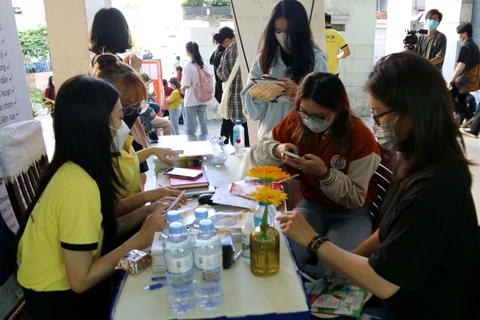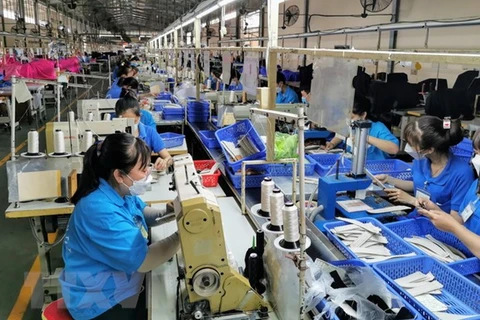 Many garment firms have suffered labour shortage due to rising COVID-19 case number (Photo: VietnamPlus)
Many garment firms have suffered labour shortage due to rising COVID-19 case number (Photo: VietnamPlus) Hanoi (VNA) – Labour shortages due to the strong rise in the number of COVID-19 infections have slowed the recovery of production activities, causing authorised agencies to consider extending overtime hours.
As a firm in the sector allowing highest yearly overtime cap of 300 hours, Garment 10 Corporation – Joint Stock Company (GARCO 10) still faces numerous difficulties in completing orders due to the new overtime reduction policy that allows a maximum of 40 hours of overtime each month.
Bach Thang Long, Deputy General Director of GARCO 10, said that the firm had received orders from 2021 and wasn’t prepared for the high rise in COVID-19 case numbers.
GARCO 10 has over 12,000 labourers working in eight provinces and cities. After the Lunar New Year (Tet) festival in early February, the company was greatly affected by COVID-19, he said. At that time, up to 70% of its workers were COVID-19 patients who took 10-14 days off.
Since Tet, on average, GARCO 10 factories have seen about 40% of its workers contract COVID-19. This meant a reduction of 50-70% in its productivity, making it difficult for the firm to complete orders. It had to work with partners to extend deliveries. It also had to pick up costs on shipping orders to keep up with demand, Long said.
Meanwhile, Nguyen Van Nguyen, Deputy General Director of tile manufacturer Catalan Ceramics in the northern province of Bac Ninh, said around 15% of the company's 800 workers contracted COVID-19 since Tet, and the remaining workers have agreed to work overtime to take up the slack.
Extending work hours by one or two hours a day "does not affect the workers much" since their jobs, mostly as machine operators, are light, he said.
 Catalan Ceramics in the northern province of Bac Ninh said around 15% of the company's 800 workers contracted COVID-19 since Tet (Photo: VietnamPlus)
Catalan Ceramics in the northern province of Bac Ninh said around 15% of the company's 800 workers contracted COVID-19 since Tet (Photo: VietnamPlus) Statistics from the Ministry of Labour, Invalids and Social Affairs (MOLISA) showed that amid the fourth wave of the COVID-19 pandemic, businesses, especially those operating in labour-intensive fields like textile-garment and leather-footwear, are facing a reduction of 30-50% of the workforce and, as a result, can hardly fulfill orders in time.
Since last October when the proposal was first released by the MOLISA for public comment, it has been warmly welcomed by businesses that have faced labour shortages. This comes after months of social distancing as many workers left to their hometowns during the lockdown period and have not yet returned to work. A recent survey found that only 141 of 265 enterprises in the South have maintained operations. The number of workers is just one-fourth of that before social distancing.
Under Article 107 of the Labour Code, the number of overtime working hours must not exceed 200 hours in one year. An employer is allowed to mobilise a worker to work overtime not exceeding 300 hours in one year in the textile, garment, leather, footwear, electric and electronic production, and in the processing of agriculture, forestry, salt and aquatic products.
However, amid impacts of the pandemic, many enterprises have suggested an overtime cap of over 40 hours a month.
According to Minister of Labour, Invalids and Social Affairs (MoLISA) Dao Ngoc Dung, the ministry is drafting a resolution on the overtime limit at enterprises.
According to the draft resolution, which is waiting for approval, the overtime cap will be adjusted to 72 hours instead of the current 40 hours per month while simultaneously applying an overtime framework to 300 hours per year for all sectors, compared to the existing 200 hours.
The proposal to increase the overtime limit is calculated appropriately and based on comparisons with the overtime cap of other countries. The proposal is in line with the aspiration of enterprises and employees on the principle of harmonising benefits and sharing risks, according to the ministry.
A large volume of enterprises, especially in manufacturing, are expected to be happy with the decision after waiting months for a ruling./.























